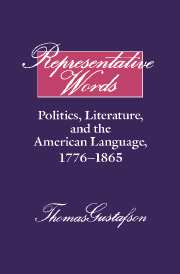Book contents
- Frontmatter
- Contents
- Acknowledgment
- Abbreviations and Editions Cited
- Introduction
- Part I The American Logocracy: The Nexus of Word and Act
- Part II Political and Linguistic Corruption: The Ideological Inheritance
- Part III The American Language of Revolution and Constitutional Change
- Part IV From Logomachy to Civil War: The Politics of Language in Post-Revolutionary America
- 9 The Unsettled Language: Schoolmasters vs. Truants
- 10 Corrupt Language and a Corrupt Body Politic, or the Disunion of Words and Things
- 11 Sovereign Words vs. Representative Men
- Afterword
- Notes
- Index
- Cambridge Studies in American Literature and Culture
9 - The Unsettled Language: Schoolmasters vs. Truants
Published online by Cambridge University Press: 05 January 2012
- Frontmatter
- Contents
- Acknowledgment
- Abbreviations and Editions Cited
- Introduction
- Part I The American Logocracy: The Nexus of Word and Act
- Part II Political and Linguistic Corruption: The Ideological Inheritance
- Part III The American Language of Revolution and Constitutional Change
- Part IV From Logomachy to Civil War: The Politics of Language in Post-Revolutionary America
- 9 The Unsettled Language: Schoolmasters vs. Truants
- 10 Corrupt Language and a Corrupt Body Politic, or the Disunion of Words and Things
- 11 Sovereign Words vs. Representative Men
- Afterword
- Notes
- Index
- Cambridge Studies in American Literature and Culture
Summary
… for no language is so settled as not to undergo continual changes, if spoken by a nation in the full vigor of social and political life. Authority, in regard to language, will go far, but never can withstand for a long time the energies and wants of a free, industrious and thinking people.
Francis Lieber, “Americanisms,” Encyclopedia Americana“The new circumstances under which we are placed,” Thomas Jefferson remarked in a letter to John Waldo in 1813, “call for new words, new phrases, and for the transfer of old words to new objects” (JLA, 1295–6). For Jefferson, an unfixed relationship between words and meanings and the unsettling linguistic process of neologization (his word) were incumbent upon Americans if they were to hold the mirror up to nature and suit their words to their actions. Creating the American system of government alone demanded transformations in political discourse. The framers of the Constitution borrowed from the past, but they also recognized that their project required them to formulate a new lexicon for politics, one that would accommodate a neologism for a political system that could not be denominated with the word “monarchy,” aristocracy,” or “democracy” or even solely with the word “national” or “federal.” Much of the difficulty in formulating the Constitution arose, as James Madison reports in Federalist No. 37, from a want of terms and the inadequacy of language, and in 1824 Madison writes: “New ideas, such as presented by our novel and unique political system, must be expressed either by new words, or by old words with new definitions” (JML, III, 435).
- Type
- Chapter
- Information
- Representative WordsPolitics, Literature, and the American Language, 1776–1865, pp. 301 - 347Publisher: Cambridge University PressPrint publication year: 1993



